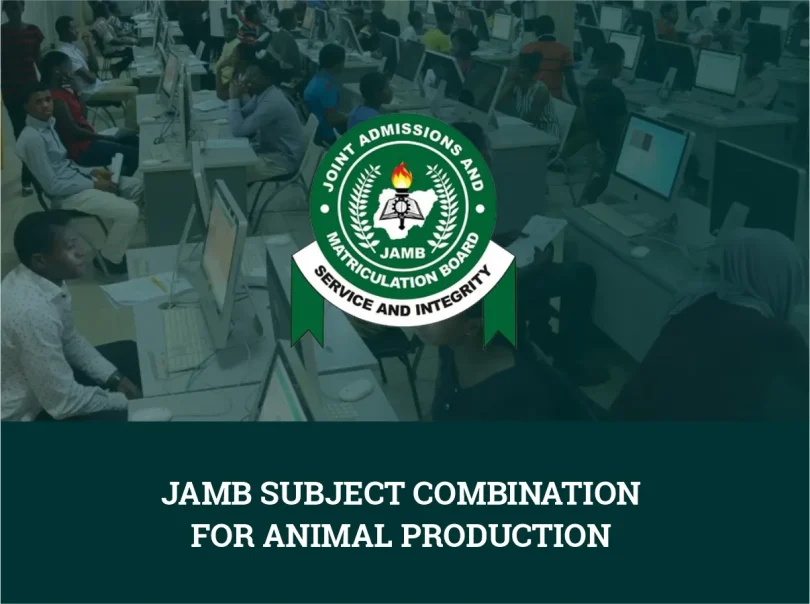JAMB Subject Combination for Animal Production – Thinking about studying Animal Production? Great choice. This course is all about the science behind raising healthy, productive animals, whether it is poultry, cattle, goats, or even fish. It is a mix of biology, agriculture, and practical knowledge that directly supports food supply chains and rural development. But before you get into any of that, you have to make sure you are choosing the right path from the start.
Studying Animal Production at the university begins with understanding what your university expects academically. Different schools might have slightly different preferences, but they all want to see that you have built your JAMB subject list around the core knowledge areas needed for Animal Production. Getting this right early on not only helps your admission chances but also makes sure you are set up for the kind of learning the course demands.
Below, we have listed out the right JAMB Subject Combination for Animal Production. If you are pursuing a degree in this field, these are the subjects you are to register.
JAMB-UTME Subject Combination for Animal Production
- English Language (compulsory), plus three of the following:
- Biology or Agricultural Science, Chemistry
- Physics or Mathematics. This combination aligns with the UTME entry requirements for Animal Production across Nigerian universities.
O’Level Requirements for Animal Production
Applicants need five credit passes (WAEC/NECO/NABTEB) in:
- English Language
- Mathematics
- Chemistry
- Biology or Agricultural Science
- Physics
These credits should be from not more than two sittings.
Institutional Notes
- Some universities (e.g., ADSU, FUTO, BASU) accept a pass in Physics combined with credit in Mathematics, or vice versa.
- MOUAU requires a pass in Physics, and credits in English, Math, Chemistry, Biology, or Agric Science, plus another science subject.
- FUTMINNA accepts one of the following as a fifth subject: Physics, Geography, Economics, Home Economics, or Food & Nutrition (with at least a pass in Physics).
Direct Entry Requirements for Animal Production
To gain admission via Direct Entry (DE), candidates need:
- Two A-level passes (or equivalent) in Chemistry plus one of: Biology, Botany, Zoology, Agricultural Science, Geography, Geology, Mathematics, or Economics.
Alternative Qualifications Accepted (varies by university)
ND/NCE/HND in relevant agricultural fields, often with a minimum of Lower Credit, plus four O’Level credits:
- ATBU & FUTMINNA accept NCE, ND, and HND in Agricultural programs.
- ADSU accepts ND Distinction HND Credit, or NCE Credit (double major).
- FUNAAB accepts ND/HND (Upper Credit) in Agriculture or related, or NCE Credit + UTME subjects.
- FUTA accepts ND (Upper Credit) in Agricultural Sciences and GCE A‑Level subject combinations.
- UMUDIKE, EKSU, and MAKURDI follow similar standards
Universities Offering Animal Production
| Institution | Program / Department |
|---|---|
| University of Jos (Federal) | Animal Production & Theriogenology |
| ATBU, Bauchi (Federal) | Animal Production |
| FUTMINNA (Federal) | Animal Production |
| MOUAU, Umudike (Federal) | Livestock Production & Management |
| FUNAAB, Abeokuta (Federal) | Animal Production & Health |
| FUTA, Akure (Federal) | Animal Production & Health |
| ADSU, Mubi (State) | Animal Production with Nutrition options |
| EKSU, Ado‑Ekiti (State) | Animal Production & Health Services |
| Crawford University (Private) | Animal Production & Fisheries |
| LAUTECH (Private) | Animal Production & Health |
| Vom College (Federal) | ND/HND in Animal Health & Production Technology |
Conclusion
Choosing the right academic path for a course like Animal Production goes beyond just meeting admission requirements; it is about setting a strong foundation for a meaningful and practical career.
This field demands a good mix of scientific understanding and real-world application, and starting with the correct subjects shows you are ready for that challenge. By aligning your choices with what the course demands, you are not just ticking boxes; you are preparing yourself to thrive in a dynamic and essential area of agriculture.







Leave a Comment